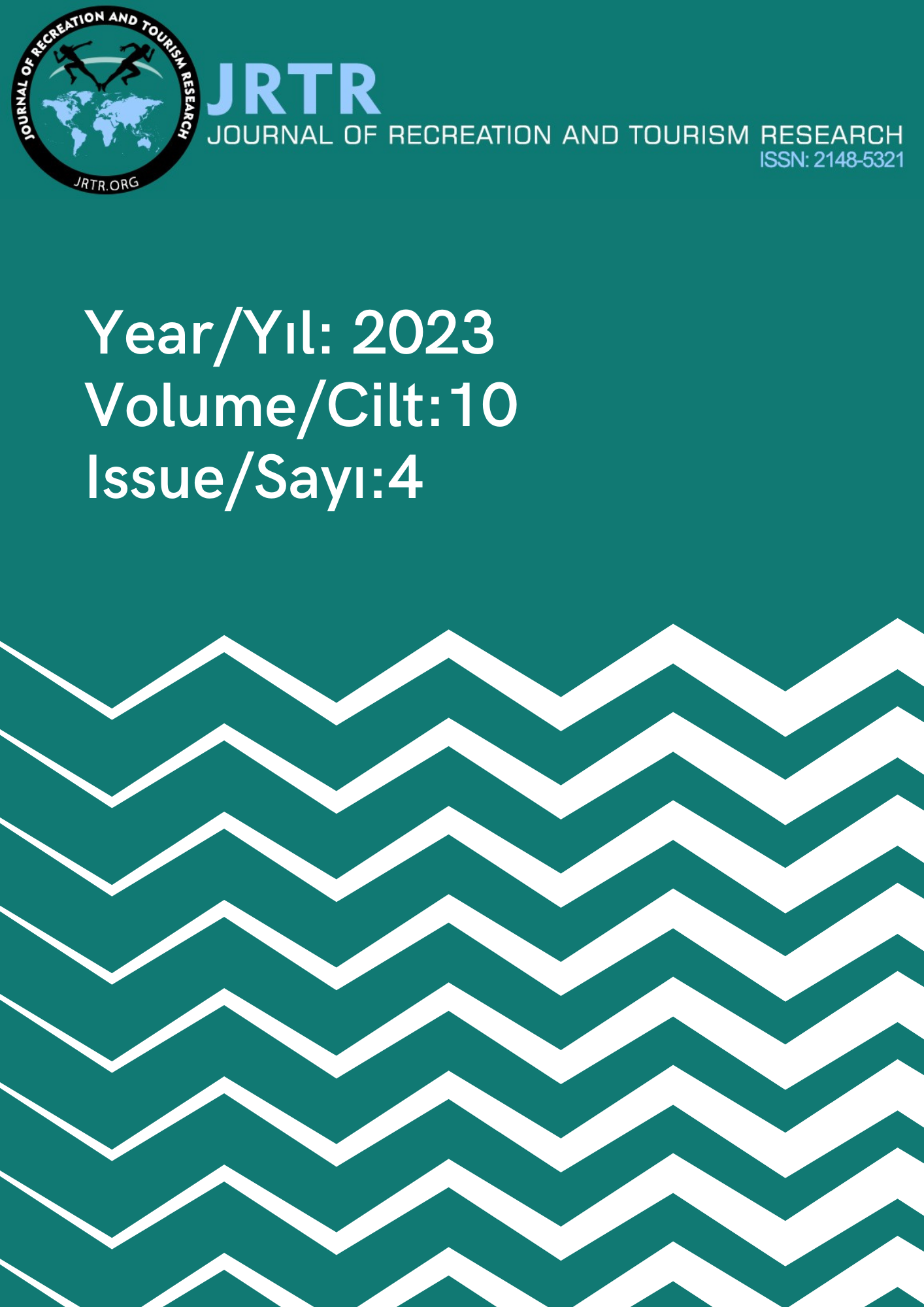Ethnic Restaurants context of Sustainable Tourism and Gastronomy: A Theoretical Analysis
DOI:
https://doi.org/10.5281/zenodo.10443146Keywords:
Ethnic Restaurants, Sustainable Gastronomy, Gastronomy Tourism, Sustainable Gastronomy TourismAbstract
In a period when international human mobility is increasing around the world, ethnic restaurants attract attention as spatialized forms of ethnic diversity and areas of interaction and meeting of different cultures. This study, which is a theoretical evaluation, carried out a conceptual discussion on the axis of sustainability through secondary data on ethnic restaurants. In this context, it has been observed that food and beverage businesses, which are very important stakeholders of tourism, exhibit a practice inherent in the sustainability paradigm with the 'ethnic' concept, and also play a functional role in terms of the sustainability of destinations. Ethnic restaurants are mostly nourished by international migration and integration processes; however, it has also been determined that it is an important sustainable tourism element in terms of discovering, preserving, and carrying cultural heritage to the future. While ethnic restaurants have been developing worldwide both in number and diversity; they have also developed the destinations. At this point, it can be seen that restaurant management in general and ethnic restaurants in particular support sustainable gastronomy and gastronomy tourism. Ethnic restaurants offer a suitable structure for sustainable gastronomy establishment; they have been evaluated that contributes to the sustainable development and image of destinations as an authentic and traditional element of attraction. At the same time, it is thought that they can contribute to the reduction of economic, sociocultural, and social problems through the interaction of different ethnicities.
Downloads
References
Agarwal, R. ve Dahm, J.M. (2015) Success Factors in Independent Ethnic Restaurants, Journal of Foodservice Business Research, 18:1, 20-33
Aksatan, M. (2016). Etnik Temalı Restoranlarda Otantiklik: Yönetici ve Tüketici Bakış Açılarına Yönelik Karşılaştırmalı Bir Çalışma, Yayınlanmamış Doktora Tezi, Dokuz Eylül Üniversitesi Sosyal Bilimler Enstitüsü. İzmir, s. 38-65.
Aljaffal, T. (2017). Investigating environmental sustainability practices among middle eastern ethnic restaurants in sydney, https://www.proquest.com/dissertations-theses/investigating-environmental-sustainability/docview/2033931519/se-2?accountid=86195
Boyce, J. B. ve Sukalakamala, P. (2007). Customer Perceptions for Expectations and Acceptance of an Authentic Dining Experience in Thai Restaurants. Journal of Foodservice. (18), 69-75.
Choi, S. ve Henneberry, D.M. (2000). Ethnic Food Marketing. Journal of Food Products Marketing. 5(4), 19-44.
Çelik, Z. (2016). Gıda Güvencesini Sağlanmanın Anahtarı: Sürdürülebilir Gıda Sistemleri, Apelasyon E-Dergisi, 29.
Deniz, A. ve Öksüz, M. (2017). Ankara’daki İran Restoranları: Kültürel Kimlik Üzerine Etnografik Bir Araştırma, Coğrafı̇ Bı̇lı̇mler dergı̇sı̇ CBD, 15 (2), 167- 185.
Doğan, M. ve Gümüş, M. (2014). Sürdürülebilir Destinasyon Yönetimi, Sürdürülebilir Bozcaada: Bir model önerisi, Seyahat ve Otel İşletmeciliği Dergisi 11 (3), 6-25
Durlu, Ö. F.; Sünnetçioğlu, S. ve Can, A. (2013). Sürdürülebilir Gastronomi Turizmi Hareketliliğinde Coğrafi İşaretlemenin Rolü, Journal of Tourism and Gastronomy Studies, 1(1), 13-20.
Ellis, A.; Park, E.; Kim, S.; Yeoman, I. (2018). What is food tourism? Tour. Manag., 68, 250-263.
Foresight (2011). The Future of Food and Farming: Challenges and Choices for Global Sustainability. www.foresight.gov.uk. (E.T. 15.11.2023)
Jang, S., Ha, J., ve Park, K. (2012). Effects of ethnic authenticity: investigating Korean restaurant customers in the US. International journal of Hospitality Management, 31, 990-1003.
Khan, M. ve Oyewole, P.O. (2014). African Americans Image Attributes and Preferences for Ethnic or International Restaurants, Journal of Foodservice Business Research, 17, 161-178.
Kurgun, H. (2017). Nörogastronomi, Kurgun, H. (Editör), Gastronomi trendleri milenyum ve ötesinde (24-35). Ankara: Detay Yayıncılık.
Liu, H., Li, H., DiPietro, R. B., & Levitt, J. A. (2018). The role of authenticity in mainstream ethnic restaurants: evidence from an independent full-service Italian restaurant. International Journal of Contemporary Hospitality, 30(2), 1035-1053.
Lu, A.C.C., Gursoy, D. ve Lu, C.Y. (2015). Authenticity Perceptions, Brand Equity and Brand Choice İntention: The Case of Ethnic Restaurants, International Journal of Hospitality Management, 50, 36-45.
Mak, A.H.N.; Lumbers, M.; Eves, A. (2012). Globalisation and food consumption in tourism. Annals of Tourism Research, 39, 171–196.
Munoz, C.L. ve Wood, N.T. (2009). A Recipe for Success: Understanding Regional Perceptions of Authenticity in Themed Restaurants, International Journal of Culture, Tourism and Hospitality Research. 3(3), 269-280.
Nebioğlu, O. (2017). Gastronomik Kimlik ve Gastronomik Turizm Ürünlerinin Sınıflandırılması Üzerine Nitel Bir Araştırma: Alanya Örneği, Journal of Tourism and Gastronmy Studies, 5/2, 39-60.
Scarpato, R. (2002). Sustainable gastronomy as a tourist products. A. Hjalager ve G. Richards (ed.) Tourism and Gastronomy içinde (ss.51-70). London and New York: Routledge.
Schulp, J.A. ve Tirali, I. (2008). Studies in Immigrant Restaurants I: Culinary Concepts of Turkish Restaurants in the Netherlands. Journal of Culinary Science & Technology. 6(2-3), 119-150.
Sökmen, A. (2003). Ağırlama Endüstrisinde Yiyecek ve İçecek Yönetimi, Ankara: Detay Yayıncılık.
Sökmen, A. (2014) Yiyecek içecek hizmetleri yönetimi ve işletmeciliği, (7. Baskı). Ankara: Detay Yayıncılık.
Sunanta, S. (2005). The Globalization of Thai Cuisine. Paper Presented at The Canada Council For Southeast Asian Studies Conference, York University, 14-16.
Yurtseven, R. (2011). Sustainable gastronomic tourism in Gokceada (Imbros): Local and authentic perspectives. International Journal of Humanities and Social Science, 1(18), 17-26.
Yurtseven, R. ve Kaya, O. (2011). Eko-gastronomi ve sürdürülebilirlik. Osman. E. Ç (ed.) 11 Ulusal Turizm kongresi, içinde (ss.57-65). Ankara: Detay Yayıncılık.
Yüncü H. R. (2010). Sürdürülebilir Turizm Açısından Gastronomi Turizmi ve Perşembe Yaylası, 10. Aybastı-Kabataş Kurultayı, 27-34.
Zhang, T., Chen, J. ve Hu, B. (2019). Authenticity, Quality, and Loyalty: Local Food and Sustainable Tourism Experience, Sustainability, 11, 3437.
Downloads
Published
How to Cite
Issue
Section
License
Copyright (c) 2023 Journal of Recreation and Tourism Research

This work is licensed under a Creative Commons Attribution-NonCommercial 4.0 International License.






